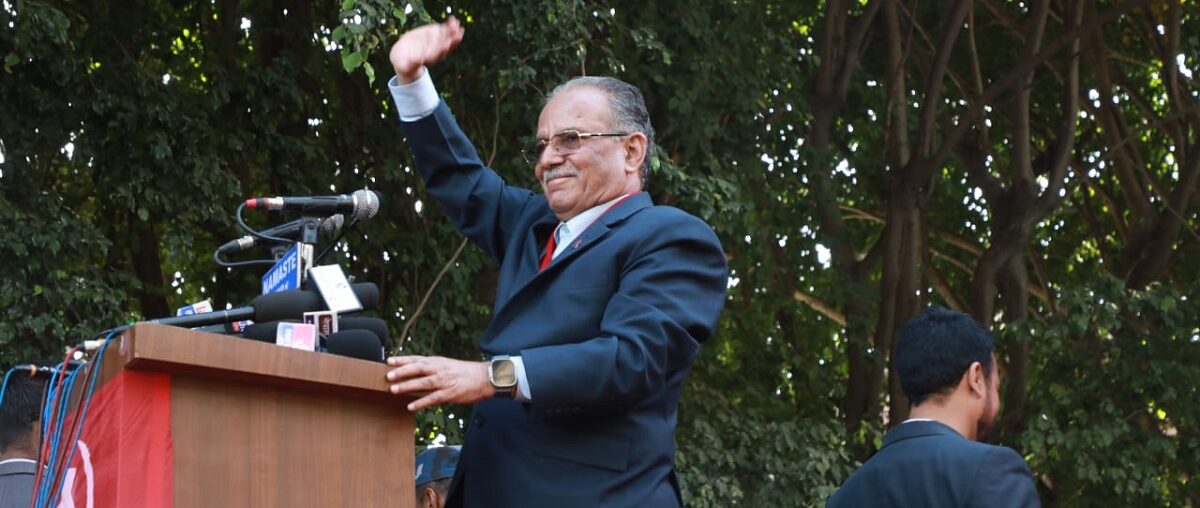KATHMANDU: The vigil organized by the main opposition –Maoist Center –in Kathmandu on Saturday spotlighted the deepening discontent with the ruling coalition led by CPN-UML and the Nepali Congress (NC).
Spearheaded by Maoist Chairman Pushpa Kamal Dahal “Prachanda”, the assembly served as a platform for the Maoists to not only express their grievances about rampant corruption and ineffective governance but also to lay the groundwork for potential political mobilization.
As Prachanda warned the government, “if the behavior does not improve, we will drag them to the streets,” it’s evident that the Maoists are gearing up for a more confrontational stance.
An escalating conflict
The urgency in the Maoists’ message cannot be understated. Prachanda’s remarks reflect a broader political strategy aimed at reclaiming their narrative as champions of the people’s concerns, especially against a backdrop of increasing allegations of corruption involving the ruling parties.
By distancing themselves from the current coalition, they are attempting to redefine their political identity and re-engage with the grassroots support that has waned over the years.
His assertion that the current government is composed of “brokers, capitalists, and corrupt people” serves to position the Maoists as the true representatives of the public’s interests.
This is a critical pivot for a party that, in the past, struggled to distance itself from its violent revolutionary past and the complexities of coalition politics.
By organizing this vigil, the Maoists are sending a clear signal: they are no longer willing to be sidelined in a government they believe has lost touch with the realities facing everyday citizens.
Prachanda’s comments about the government’s inaction, particularly in response to the recent floods that left families stranded, underscore a significant disconnect between governmental promises and the lived experiences of the populace.
He emphatically stated, “It is not just a family that’s dead; there’s a government that’s dead.”
Such remarks are intended to resonate deeply with an electorate that has witnessed the failures of leadership during critical crises.
Self-Reflection and Repositioning
Prachanda’s admission that aligning with the Nepali Congress and CPN-UML was a mistake marks a significant moment for the Maoist Center.
This introspection aims to re-establish the party’s credibility and accountability.
Historically, the Maoists have been criticized for their governance and their alignment with parties that some view as complicit in corrupt practices.
If the government fails to respond effectively to the calls for transparency and accountability, it risks alienating not only its political opponents but also a significant portion of the electorate.
By distancing themselves from the current coalition, they are attempting to redefine their political identity and re-engage with the grassroots support that has waned over the years.
Maoist Center’s leader Rameshwar Raya Yadav’s remarks about the Maoists having laid down their guns but retaining their “wisdom and strength” serve as an important reminder of their transformation from a revolutionary force to a political party.
This rhetoric is aimed at reassuring supporters that the Maoists still possess the capability to challenge the status quo and represent the people’s voice, despite their past association with violence.
Accountability and Governance
A key theme emerging from the vigil was the call for accountability. The Maoists pointed to the government’s failure to act decisively during the floods and landslides, highlighting a broader trend of negligence and incompetence.
Prachanda cited past scandals, such as the Bhutanese refugee case and various corruption issues, as evidence that the current government is not only failing to address pressing issues but is also mired in its own controversies.
This framing positions the Maoists as a legitimate alternative in a political landscape characterized by disillusionment.
The Threat of Escalation
Prachanda’s warning to the ruling coalition, particularly his assertion that if they continue to ignore the opposition’s demands, they will “ask for answers in a rude manner on the street,” reveals a readiness to escalate protests.
This is not just a threat; it’s a strategic move to galvanize public sentiment and frame the narrative around accountability and justice.
The language of confrontation suggests that the Maoists are prepared to mobilize their base and leverage public frustration to challenge the government more aggressively.
This declaration is also a reminder to the ruling parties that the political landscape in Nepal remains volatile.
As the political climate grows more contentious, both the Maoists and the government will need to engage in a careful balancing act, with the potential for major implications for the future of governance in Nepal.
The Maoists are tapping into a reservoir of public dissatisfaction that could translate into significant political pressure if not addressed adequately.
Their ability to translate this sentiment into a cohesive movement will be crucial in the coming months.
Implications for the Ruling Coalition
The rally underscored the challenges facing the ruling coalition. Prime Minister KP Oli’s government must contend with growing public dissatisfaction, as evidenced by the Maoists’ criticism.
If the government fails to respond effectively to the calls for transparency and accountability, it risks alienating not only its political opponents but also a significant portion of the electorate.
Prachanda’s remarks about the government’s focus on internal power struggles, such as attempts to remove Kulman Ghising from the Nepal Electricity Authority, further suggest a lack of attention to the pressing issues that matter to the public.
In this context, the coming weeks and months could prove pivotal. As the Maoists seek to reinvigorate their base and assert themselves as a viable alternative to the ruling coalition, the government will need to navigate a landscape marked by increasing tensions and potential public unrest.
Conclusion
The CPN-Maoist Center’s vigil in Kathmandu is more than a mere protest; it is a significant moment in Nepal’s political landscape that signals a renewed commitment to challenge the ruling coalition on issues of governance and accountability.
Prachanda’s emphasis on self-reflection and repositioning within the party highlights a strategic pivot aimed at reconnecting with disenchanted voters.
As the political climate grows more contentious, both the Maoists and the government will need to engage in a careful balancing act, with the potential for major implications for the future of governance in Nepal.
Ultimately, the success of the Maoists in this endeavor will hinge on their ability to translate their rhetoric into action that resonates with the populace, compelling the ruling coalition to respond meaningfully to the growing chorus of discontent.
The political stakes have never been higher, and both sides must tread carefully in this dynamic and evolving landscape.









Comment